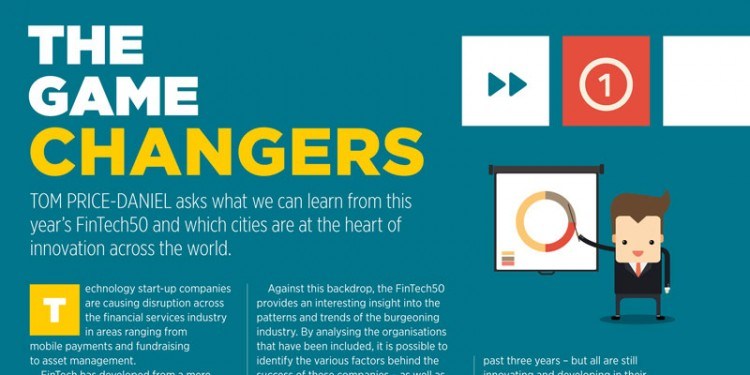Tom Price-Daniel asks what we can learn from this year’s FinTech50 and which cities are at the heart of innovation across the world.
Technology start-up companies are causing disruption across the financial services industry in areas ranging from mobile payments and fundraising to asset management.
FinTech has developed from a mere media buzzword and is radically changing how we live and do business. In 2015 alone, the industry generated over £6bn in revenue and employed over 60,000 people, with 2016 set to be an even bigger year for FinTech.
Now in its fourth year, the annual independent FinTech50 list includes the industry’s most influential tech executives and leading venture capitalists, selected by an expert panel. The companies that have secured a position on the FinTech50 2016 have all demonstrated long-term potential for winning new customers, and will therefore help to further the impact that FinTech has had on the financial industry.
Against this backdrop, the FinTech50 provides an interesting insight into the patterns and trends of the burgeoning industry. By analysing the organisations that have been included, it is possible to identify the various factors behind the success of these companies – as well as areas where certain changes could deliver even greater success.
IN THE SPOTLIGHT
One company that secured a place on the list is Blockchain – ‘the world’s most popular Bitcoin wallet’. Founded in 2011, the London-based firm was the first Bitcoin company to achieve five million users in 2015. Since then, the number of transactions processed through its platform has doubled and it has expanded its global outreach with offices in London, New York and Luxembourg, helping to make it a huge international competitor within its field.
Another company to feature in the FinTech50, Everledger, was founded in 2015 by Leanne Kemp – and is one of just two FinTech50 companies to have a female CEO. Based in London, the company uses the technology behind Bitcoin to tackle the diamond industry’s expensive fraud and theft problem.
There are no set criteria for the FinTech50 and there is a different reason behind each company’s selection. Some have been on the panel’s radar since they set out as small start-ups, whilst others have been on the FinTech50 list for the past three years – but all are still innovating and developing in their chosen sector.
LOCATION, LOCATION, LOCATION
One interesting element of the FinTech50 2016 is the geography of where the companies are based. London continues to dominate the FinTech landscape, with more than half of this year’s list being located in the City. This area is fast becoming the home of FinTech due to its access to funding from investors and its ability to attract the right talent.
London continues to grow as a home for FinTech companies, with an increase from 24 companies featured on the list in 2015 to 29 this year. Whilst it goes from strength to strength, it nevertheless faces serious challenges for its title from other European cities such as Berlin, Amsterdam and Stockholm.
For a start, London faces an uncertain period with economic challenges such as housing issues, which could affect new start-up FinTech companies looking for a base. However, the confidence surrounding London as the home of FinTech suggests that the number of innovative companies basing themselves in the capital will continue to grow.
GENDER DIVERSITY AND TALENT
Even though the FinTech industry is flourishing, it is facing huge competition from the larger technology firms like Google and Facebook, who have the pick of the best new talent in this area. However, as the FinTech50 looks to promote the next generation of household-name companies, the industry needs to ensure it is creating the reputation it wants by highlighting the exciting nature of this work.
One issue that surrounds FinTech is gender diversity. Analysis from Alderbrooke showed that the lack of women was most evident in senior positions; of 355 leadership positions available, only 33 are held by women – only two of whom are CEOs. Overall, the 2016 FinTech50 includes fewer women in leadership roles than the previous list in 2015, signalling that there is significant work to be done to reverse this trend and encourage a more diverse FinTech community.
Gender diversity has long been an issue in the banking industry, but the new start-up companies in FinTech do not have the same legacy to deal with as more established organisations.
As such, the FinTech sector should be looking to prevent gender diversity from becoming an issue by supporting female development and establishing policies, culture and governance to ensure that women have the opportunity to make it to the top level. By addressing the issue of gender diversity in this way, firms will be in a much stronger position to attract the right talent in order to remain innovative and competitive.
FORWARD PLANNING
With FinTech continuing to attract record investment and create innovative products, this exciting industry is revolutionising the financial sector and helping firms to address the change in consumer needs. 2016 is likely to be a pivotal year for FinTech, but there are nonetheless some key issues to consider.
First and foremost, hiring the best talent and encouraging greater gender diversity will be fundamental if the industry wants to avoid the same pitfalls as its predecessors. With innovative technology constantly being developed, the industry shows no sign of slowing down. With all eyes on FinTech, it will be interesting to see which companies make the FinTech50 in 2017.
To view the article in PDF format, please use the download button above.

